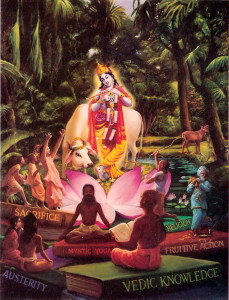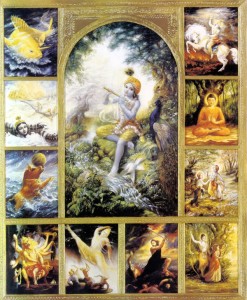With the blessings of our Bhakti-Vaibhava teacher, HG Radha Krsna Prabhu from Houston, I started sequential Srimad Bhagavatam study with other devotees here in Seattle. We meet weekly once to read and discuss a section of verses from Srimad Bhagavatam. To go deeper in my study and in preparation for the class, I started reading Srila Prabhupada’s purports scrutinizingly, in addition to His lectures wherever applicable and started taking notes on them. Along with the notes, I’ve listed appropriate examples / discussion points which help enhance the understanding of Srila Prabhupada’s purports along with bringing forth key points for practical application in our devotional lives. In a nutshell, I plan to share my Srimad Bhagavatam notes along with the audio recordings on this site for the following purposes:
- To save and organize my notes with links to entire stories elsewhere on the site for my own future reference.
- For use of reference material by the devotees in the study group during the class and later.
- To serve all other devotees who may embark on studying Srimad Bhagavatam deeply.
NOTES COLLECTION
SB-1.3.1-2: Three Vishnus
SB-1.3.1-2: Sūta said: In the beginning of the creation, the Lord first expanded Himself in the universal form of the puruṣa incarnation and manifested all the ingredients for the material creation. And thus at first there was the creation of the sixteen principles of material action. This was for the purpose of creating the material universes.
Those fortunate living entities who catch the truth and surrender unto the lotus feet of Vāsudeva after many, many births in the material world join the eternally liberated souls and thus are allowed to enter into the kingdom of Godhead. After this, such fortunate living entities need not come again within the occasional material creation. But those who cannot catch the constitutional truth are again merged into the mahat-tattva at the time of the annihilation of the material creation.
SB-1.2.33-34: Lord personally comes
SB-1.2.33-34: The Supersoul enters into the bodies of the created beings who are influenced by the modes of material nature and causes them to enjoy the effects of these modes by the subtle mind.
The Lord as Paramātmā helps the living being to get material happiness because the living being is helpless in all respects in obtaining what he desires. He proposes, and the Lord disposes. In another sense, the living beings are parts and parcels of the Lord. They are therefore one with the Lord. In the Bhagavad-gītā the living beings in all varieties of bodies have been claimed by the Lord as His sons. The sufferings and enjoyments of the sons are indirectly the sufferings and enjoyments of the father. Still the father is not in any way affected directly by the suffering and enjoyment of the sons. He is so kind that He constantly remains with the living being as Paramātmā and always tries to convert the living being towards the real happiness.
SB-1.2.30-32: One supersoul
SB-1.2.30-32: The Lord, as Supersoul, pervades all things, just as fire permeates wood, and so He appears to be of many varieties, though He is the absolute one without a second.
As from wood, fire can be manifested, or as butter can be churned out of milk, so also the presence of the Lord as Paramātmā can be felt by the process of legitimate hearing and chanting of the transcendental subjects which are especially treated in the Vedic literatures like the Upaniṣads and Vedānta. Śrīmad-Bhāgavatam is the bona fide explanation of these Vedic literatures. The Lord can be realized through the aural reception of the transcendental message, and that is the only way to experience the transcendental subject. As fire is kindled from wood by another fire, the divine consciousness of man can similarly be kindled by another divine grace. His Divine Grace the spiritual master can kindle the spiritual fire from the woodlike living entity by imparting proper spiritual messages injected through the receptive ear.
SB-1.2.28-29: Vasudeva – Our ultimate goal
 SB 1.2.28-29: In the revealed scriptures, the ultimate object of knowledge is Śrī Kṛṣṇa, the Personality of Godhead. The purpose ofperforming sacrifice is to please Him. Yoga is for realizing Him. All fruitive activities are ultimately rewarded by Him only. He is supreme knowledge, and all severe austerities are performed to know Him. Religion [dharma] is rendering loving service unto Him. He is the supreme goal of life.
SB 1.2.28-29: In the revealed scriptures, the ultimate object of knowledge is Śrī Kṛṣṇa, the Personality of Godhead. The purpose ofperforming sacrifice is to please Him. Yoga is for realizing Him. All fruitive activities are ultimately rewarded by Him only. He is supreme knowledge, and all severe austerities are performed to know Him. Religion [dharma] is rendering loving service unto Him. He is the supreme goal of life.SB-1.2.26-27: Just worship Krsna
 SB 1.2.26: Those who are serious about liberation are certainly nonenvious, and they respect all. Yet they reject the horrible and ghastly forms of the demigods and worship only the all-blissful forms of Lord Viṣṇu and His plenary portions.
SB 1.2.26: Those who are serious about liberation are certainly nonenvious, and they respect all. Yet they reject the horrible and ghastly forms of the demigods and worship only the all-blissful forms of Lord Viṣṇu and His plenary portions.
Highly qualified brāhmaṇas situated in the mode of goodness have no grudges against the mode of worship of others. They have all respect for other demigods, even though they may look ghastly, like Kāla-bhairava or Mahākālī. They know very well that these horrible features of the Supreme Lord are all different servitors of the Lord under different conditions, yet they reject the worship of both horrible and attractive features of the demigods, and they concentrate only on the forms of Viṣṇu because they are serious about liberation from the material conditions. The demigods, even to the stage of Brahmā, the supreme of all the demigods, cannot offer liberation to anyone.
SB 1.2.24-25: Beyond sense perception
SB 1.2.24: Firewood is a transformation of earth, but smoke is better than the raw wood. And fire is still better, for by fire we can derive the benefits of superior knowledge [through Vedic sacrifices]. Similarly, passion [rajas] is better than ignorance [tamas], but goodness [sattva] is best because by goodness one can come to realize the Absolute Truth.
As explained above, one can get release from the conditioned life of material existence by devotional service to the Personality of Godhead. It is further comprehended herein that one has to rise to the platform of the mode of goodness (sattva) so that one can be eligible for the devotional service of the Lord. But if there are impediments on the progressive path, anyone, even from the platform of tamas, can gradually rise to the sattva platform by the expert direction of the spiritual master. Sincere candidates must, therefore, approach an expert spiritual master for such a progressive march, and the bona fide, expert spiritual master is competent to direct a disciple from any stage of life: tamas, rajas or sattva.

